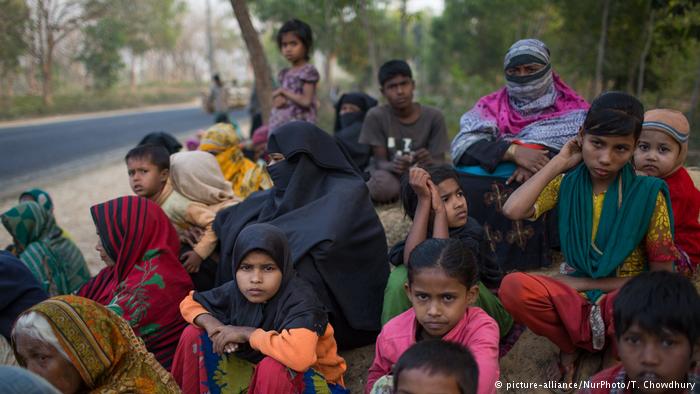
Bangladesh sees fresh influx of Rohingyas from Myanmar
 Dhaka estimates that nearly 400,000 Rohingya refugees are living in squalid refugee camps and makeshift settlements in Cox's Bazar
Dhaka estimates that nearly 400,000 Rohingya refugees are living in squalid refugee camps and makeshift settlements in Cox's Bazar
Hundreds of Rohingyas have entered Bangladesh in recent days following a fresh military build-up in Rakhine state of neighbouring Myanmar, community leaders said on Wednesday.
Reports suggest at least 500 Rohingya had made the difficult journey into Bangladesh, some claiming they had been abused by soldiers in Myanmar.
The latest influx follows a bloody military crackdown on the mainly Muslim minority in Myanmar which began in October 2016 and has led to an influx of tens of thousands of refugees into Bangladesh. The United Nations has said the violence may amount to ethnic cleansing.
Local sources said the Myanmar army has been deployed with heavy weapons in addition to the Myanmar Border Guard Forces (BGF).
According to the accounts of three Rohingya refugees who spoke to this correspondent by phone, in the past week alone around 200 Rohingyas have been detained in so-called ‘militant drives’ which have targeted houses in 11 Rohingya villages.
Mujib Ullah, Mina Ara Begum, and Maulana Mofiz Mia said the Myanmar army have been arresting Rohingya men from their houses. Even though the army let go of a few of these men, most of them are still missing. Meanwhile, locals fear leaving their houses.
BGB are on alert
Lt Col Monzurul Hasan Khan, commander of the 34 battalion of Border Guard Bangladesh (BGB) in Cox’s Bazar, said his force was currently on alert and was observing the situation.
“We strongly oppose the decision taken by Myanmar to deploy the army at their border,” he said. “According to the international law, any state which deploys an army at its border like this has to notify its neighbouring countries.”
At the same time, Lt Col Monzurul said the BGB could not allow new Rohigya refugees to come into Bangladesh “in any way possible”.
However, another commander from the 2nd battalion of BGB in Teknaf, Lt Col SM Ariful Islam said the BGB was not upset with Myanmar’s decision to deploy its army at its border, ”because it is their international affair”.
“However, by taking a counter initiative, we have expressed our disapproval toward their decision. Our force is on alert in the Bangladesh-Myanmar border,” he said.
Dhaka estimates that nearly 400,000 Rohingya refugees are living in squalid refugee camps and makeshift settlements in Cox’s Bazar.
The numbers swelled last October when more than 70,000 Rohingya villagers began arriving, bringing stories of systematic rape, murder and arson at the hands of Myanmar soldiers.
Last week, the UN special rapporteur Yanghee Lee voiced alarm at reports that an army battalion had flown into Rakhine state to help local authorities boost security in the region.
Buddhist-majority Myanmar has long faced criticism for its treatment of the more than one million Rohingya who live in Rakhine, who are seen as interlopers from Bangladesh, denied citizenship and access to basic rights.
An official with the UN International Organisation for Migration (IOM), which looks after settlements for unregistered Rohingya refugees, said the organisation was aware of new arrivals.
The numbers were “not as alarming as the October influx,” the official said.
Part of this story is contributed by AFP
Copyright © 2025 UkhiyaNews.Com. All rights reserved.